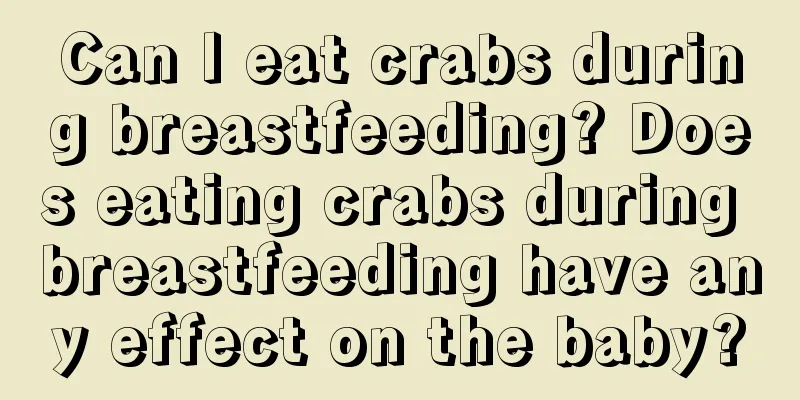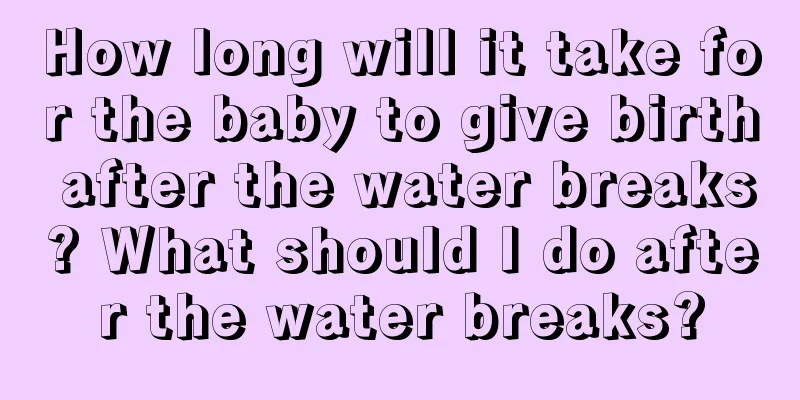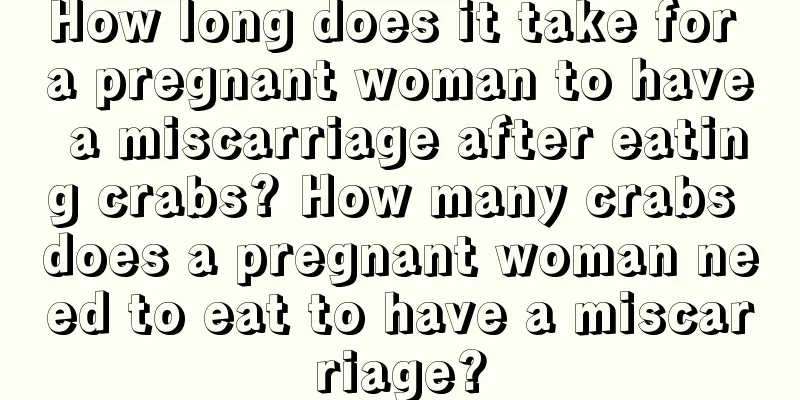Can I eat crabs during breastfeeding? Does eating crabs during breastfeeding have any effect on the baby?

|
Breastfeeding is a special period for mothers, especially in terms of diet. Because the baby absorbs what the mother eats, so the crab season is coming soon. Can breastfeeding mothers eat crabs? Does eating crabs during breastfeeding have any effect on the baby? Can I eat crabs during breastfeeding?Crabs with delicious fat and fresh juicy meat make many people drool. So can you eat crabs during breastfeeding? Breastfeeding mothers can eat crabs, but they must eat a small amount and not eat too much. Because crabs are cold in nature and contain a variety of proteins and purines, eating too much may cause skin allergies in babies, aggravate eczema, cause diarrhea, and induce autoimmune system diseases in babies. In addition, crabs are prone to parasites, viruses, or heavy metals such as lead, so breastfeeding mothers should be cautious when eating crabs. Therefore, mothers should be patient for the sake of their babies’ health and never let their babies get sick because of their greed. If possible, it is best not to eat crabs. If you really can’t help it, you can only eat one to satisfy your craving, and it must be fresh. In addition, you should pay attention to other foods after eating crabs, and avoid eating cold foods to increase the burden on the gastrointestinal tract and cause diarrhea. For example, cucumbers, peanuts, and persimmons should not be eaten with crabs. If breastfeeding mothers eat a lot of crabs, it is recommended to consult a doctor for specific solutions. Can you eat crabs during breastfeeding? During this special period, mothers need to pay attention to many things! If you are not careful, you may eat the wrong things. Many mothers cannot control their mouths during breastfeeding, which makes the baby suffer a lot! So can you eat crabs during breastfeeding? The answer is of course no! Why? Let me tell you one by one! The harm of eating crabs during breastfeeding to the babyMay cause diarrhea and allergies in babies Experts indicate that if you eat crabs during breastfeeding, your baby is likely to suffer from diarrhea and eczema. Adults with skin diseases are told not to eat seafood, not to mention children who are not fully developed. Crabs are high-protein foods, which can easily cause allergies in babies, or even constant diarrhea. Therefore, mothers need to avoid eating crabs during breastfeeding! Otherwise, it is really because of your own mistakes that the punishment is on the baby. It is especially reminded that crabs cannot be eaten with celery, pomegranates, oranges and other foods, so mothers need to pay attention! In addition, crabs may contain parasites, viruses or heavy metals such as lead, which make it difficult for us to eat crabs happily. In addition to the hazards mentioned above, you should also be careful after eating crabs. You must avoid eating cold foods, which will increase the burden on the gastrointestinal tract and cause diarrhea. Do not eat cucumbers, peanuts, persimmons, etc. with crabs. Avoid high-protein foods Mothers need to avoid not only crabs, but also other seafood, as well as neglected foods with high sugar and salt content. In any case, this is also for the health of the baby. During breastfeeding, you need to arrange your diet reasonably. Vegetables and fruits are absolutely indispensable; spicy and overly sour foods are also not allowed; you also need to be extra careful when drinking milk, because milk contains protein, so as not to cause eczema in your baby. If your baby's diarrhea or eczema is too severe, you need to see a doctor for timely treatment. 7 principles for breastfeeding mothers to eat crabs1. Do not eat too much, it is best not to exceed 100 grams each time. If there are any adverse reactions after eating, you must stop eating immediately. 2. Do not eat crabs that are not fresh. Try to eat fresh crabs. This is because crabs will secrete a substance that is harmful to the human body when they are on the verge of death. As the crabs die longer, their meat will rot and breed more bacteria, which is more likely to cause food poisoning. 3. Do not eat crabs that are not fully cooked. Although modern people believe that there are many ways to eat crabs, due to the serious pollution in various aspects, crabs often contain a large number of bacteria. If they are not fully cooked, it is very easy to cause food allergies. Generally, the crab shells of crabs that have been sterilized at high temperatures are red. 4. Only eat crab meat, crab paste, and crab roe. The large intestine, gills and other parts of the crab should not be eaten because these parts have accumulated a large amount of toxins, which can easily cause allergic reactions if eaten. 5. People with allergies should not eat crabs. People who are allergic to crabs and other seafood should not eat crabs. 6. It is not advisable to drink cold drinks after eating. Eating crabs and drinking iced drinks at the same time can easily cause gastrointestinal problems. 7. It is best not to eat sweet potatoes, honey, persimmons, celery, pomegranates and other foods when eating crabs. No. 5 website warm reminder: Although crabs are delicious and meaty, for the healthy growth of babies, mothers should restrain themselves. If you really can't help it, you can eat one, but don't eat too much. Otherwise, it will cause harm to the baby, and it will be too late to regret it~ |
<<: Can people with eczema wear diapers? Will diapers affect fertility?
Recommend
What is the appropriate temperature for bathing your baby in winter? What are the precautions for bathing your baby in winter?
For mothers, bathing babies in winter is a big pr...
How to eliminate swelling on pregnant women's faces? Drinking water scientifically is the key
Many women experience facial swelling during preg...
Should pregnant women with diabetes give birth early? Should pregnant women with diabetes be hospitalized?
Diabetes is a very common disease nowadays. Many ...
What does IVF mean? Who is suitable for IVF?
Couples who cannot conceive normally under natura...
What should I learn before going to kindergarten? What should I learn before going to kindergarten?
What should you learn before going to kindergarte...
Can hyaluronic acid remove stretch marks? Can hyaluronic acid remove stretch marks?
Stretch marks are something that many mothers are...
Does emotion affect pregnancy? Does bad emotion affect pregnancy?
Will bad mood affect pregnancy? Many people are v...
Can Liushen Flower Dew Water be used after it expires? What is the use of Liushen Flower Dew Water after it expires?
A bottle of Liushen Floral Water can be used for ...
Can pregnant women eat longan? Is it good for pregnant women to eat longan?
Longan is a very common fruit. It has good nutrit...
Are safety seats universal? Are safety seats required by law?
Most of us parents know that safety seats are ver...
When is the best time for children to learn piano?
The education of smart and outstanding children s...
Can roasted oranges cure children's coughs? Some points to note when roasting oranges to cure coughs
Injections and taking medicines are nightmares fo...
What are the symptoms of baby's food accumulation? Four phenomena should be watched out for
The first is that the baby's tongue coating b...
How about the NUK wide mouth PA colored milk bottle? Is it easy to use?
German Nuk recently launched a new wide-mouth PA ...
Why do children love to talk back to their parents? How to deal with it
When faced with many cases of disobedience and re...









